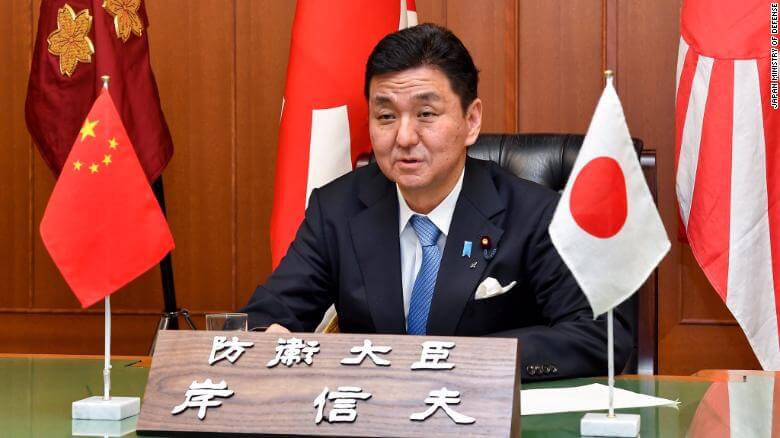During a two-hour video teleconference between Japanese Defence Minister Nobuo Kishi and his Chinese counterpart Wei Fenghe on Monday, two sides agreed to launch a hotline between their respective defence authorities by the end of 2022. According to a press release by the Japanese Defence Ministry, the hotline will aim “to improve the effectiveness of the Maritime and Aerial Communication Mechanism.”
The pair also discussed the situation in Taiwan, the China Coast Guard (CCG) Law, and the East China Sea, where both countries have a long-standing dispute over the ownership of the Senkaku Islands, which China refers to as the Diaoyu.
Kishi reiterated the Japanese government’s opposition to China’s unilateral attempts to change the status quo in the region through coercion and expressed “grave concerns against such actions.” He also noted that People’s Liberation Army and Chinese Coast Guard vessels had frequently violated international norms and “strongly called for self-restraint” in this regard.
On December 27, #DefenseMinisterKishi held a VTC with Wei Fenghe, Minister for Defense of the PRC. DMK stated that Japan opposes attempts of unilateral change to the status quo by coercion regarding the East China Sea situation and strongly called for self-restraint. pic.twitter.com/gkg9ndS3eB
— Japan Ministry of Defense/Self-Defense Forces (@ModJapan_en) December 27, 2021
China, meanwhile, stood by its stance of sovereignty claims over the disputed islands.”China will firmly safeguard its territorial sovereignty and maritime rights and interests. The two sides should focus on the overall interests of bilateral relations and strive to maintain stability in the East China Sea,” China’s Defense Ministry responded through a press release.
Kishi stressed the importance of stability in the politically sensitive Taiwan Strait and stated that peace and stability across the Taiwan Strait are “extremely important for Japan’s security as well as stability of the international community.” He declared that Tokyo “will continue to closely monitor the relevant developments” with “a sense of crisis.” “What’s happening in Taiwan is directly linked to Japan. Ninety per cent of energy that Japan uses is imported through the areas around Taiwan,” Kishi reasoned.
The Japanese minister also expressed “serious concerns” about the CCG Law that was passed in January this year. The law militarised and empowered the CCG to use “all necessary means,” including the use of force, against foreign vessels that enter waters that Beijing deems to fall under its own territory. In addition, structures formed by other countries on its waters can also now be demolished by the CCG.
In October, Japan’s ruling Liberal Democratic Party unveiled its new manifesto. In an unprecedented move, the document included a long-term goal of spending 2% of the country’s annual Gross Domestic Product, which is usually about $100 billion or more, on military upkeep. The change was made in the face of rising aggression from China and North Korea in the region.
Kishi and Wei’s meeting comes after Japan decided that it will not be sending a high-level political delegation to the Beijing Winter Olympics in February 2022.

